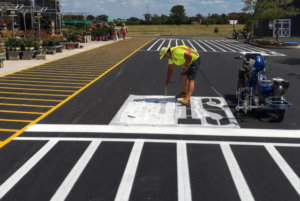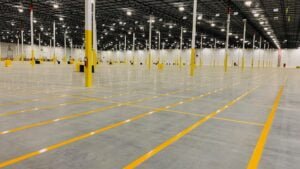When it comes to the durability of asphalt parking lots, one crucial factor that often gets overlooked is compaction. Proper compaction is essential for ensuring the longevity and strength of the pavement. In this article, we will explore the importance of compaction, the challenges encountered during the process, and the solutions to overcome them.
Why is Compaction Important?
Compaction is the process of mechanically compressing the asphalt layers to eliminate air voids and achieve maximum density. Proper compaction ensures that the asphalt mixture is tightly bonded, reducing the risk of premature deterioration and structural failure.
Here are some key reasons why compaction is vital for asphalt parking lot durability:
- Increase in Strength: Compaction improves the overall strength of the asphalt pavement, making it more resistant to heavy traffic loads and reducing the likelihood of cracks and potholes.
- Enhanced Stability: Proper compaction helps to stabilize the asphalt layers, preventing shifting and settlement that can lead to uneven surfaces and water drainage issues.
- Improved Longevity: Compacted asphalt has a longer lifespan as it can withstand the effects of weathering, temperature fluctuations, and aging more effectively.
Challenges Encountered during Compaction
While compaction plays a crucial role in ensuring the durability of asphalt parking lots, there are several challenges that contractors may encounter during the process:
- Inadequate Equipment: Using outdated or insufficient compaction equipment can result in uneven compaction, leaving behind air voids and weak spots in the pavement.
- Variable Asphalt Mix: Variations in the asphalt mix, such as aggregate size, binder content, and temperature, can affect the compaction process and lead to inconsistencies in density.
- Time Constraints: Limited time for compaction due to project deadlines or unfavorable weather conditions can compromise the quality of compaction, resulting in subpar pavement durability.
Solutions to Overcome Compaction Challenges
Fortunately, there are effective solutions available to overcome the challenges encountered during the compaction process:
- Invest in Quality Equipment: Contractors should use modern compaction equipment that is properly maintained and suitable for the specific project requirements. This ensures uniform compaction and eliminates weak spots.
- Implement Quality Control Measures: Regular testing of the asphalt mix, including gradation, temperature, and binder content, helps identify any variations that may affect compaction. Adjustments can then be made to achieve optimal density.
- Plan for Adequate Time: Adequate time allocation for compaction is crucial to ensure proper density. Scheduling projects with realistic timelines and accounting for potential weather delays can help maintain the quality of compaction.
In addition to these solutions, it is essential for contractors to have skilled and experienced personnel who understand the importance of compaction and can effectively monitor and adjust the process as needed.
Conclusion
Compaction is a critical factor in ensuring the durability of asphalt parking lots. By achieving proper compaction, contractors can enhance the strength, stability, and longevity of the pavement. Despite the challenges that may arise during the compaction process, investing in quality equipment, implementing quality control measures, and allowing adequate time can help overcome these obstacles and ensure the successful completion of durable asphalt parking lot repairs.






